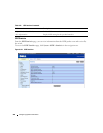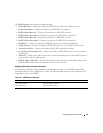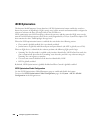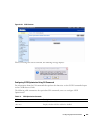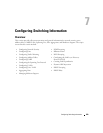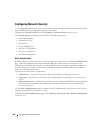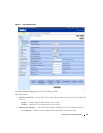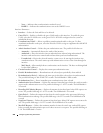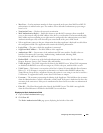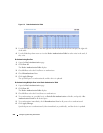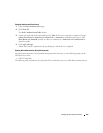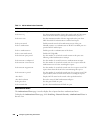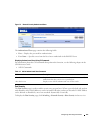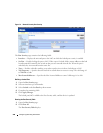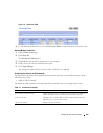
292 Configuring Switching Information
–
None
— Indicates that no authentication method is used.
–
RADIUS
— Indicates that authentication occurs at the RADIUS server.
Interface Parameters
•
Interface
— Selects the Unit and Port to be affected.
•
Guest VLAN
— Enables or disables the guest VLAN mode on this interface. To enable the guest
VLAN, select the VLAN ID to use as the guest VLAN. All VLANs configured on the system are
included in the menu.
•
Unauthenticated VLAN
— Allows or prohibits unauthenticated traffic on the port. To allow
unauthenticated traffic on the port, select the ID of the VLAN to assign to supplicants that fail 802.1X
authentication.
•
Admin Interface Control
— Defines the port authorization state. The possible field values are:
–
Automode
— Automatically detects the mode of the interface.
–
Authorized —
Places the interface into an authorized state without being authenticated. The
interface sends and receives normal traffic without client port-based authentication.
–
Unauthorized
—
Denies the selected interface system access by moving the interface into
unauthorized state. The switch cannot provide authentication services to the client through the
interface.
–
MAC-based
— Allows multiple hosts to authenticate on the interface. The hosts are distinguished
by their MAC addresses.
•
Current Interface Control
— Displays the current port authorization state.
•
Periodic Re-Authentication
— Reauthenticates the selected port periodically, when enabled.
•
Re-Authentication Period
— Indicates the time span in which the selected port is reauthenticated.
The possible field range is
300–4294967295
seconds. The field default is 3600 seconds.
•
Re-Authenticate Now
— Forces immediate port reauthentication, when selected.
•
Authentication Server Timeout
— Defines the amount of time that lapses before the switch resends a
request to the authentication server. The possible field range is 1–65535 seconds. The field default is
30 seconds.
•
Resending EAP Identity Request
— Defines the amount of time that lapses before EAP requests are
resent. The possible field range is 1–65535 seconds. The field default is 30 seconds.
•
Quiet Period
— Defines the amount of time that the switch remains in the quiet state following a
failed authentication exchange. The possible field range is 0–65535 seconds. The field default is 60
seconds.
•
Supplicant Timeout
— Defines the amount of time that lapses before EAP requests are resent to the
user. The possible field range is 1–65535 seconds. The field default is 30 seconds.
•
Max EAP Requests
— Defines the maximum number of times the switch can send an EAP request
before restarting the authentication process if it does not receive a response. The possible field range is
1–10. The field default is 2 retries.



